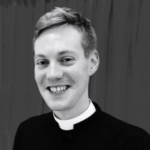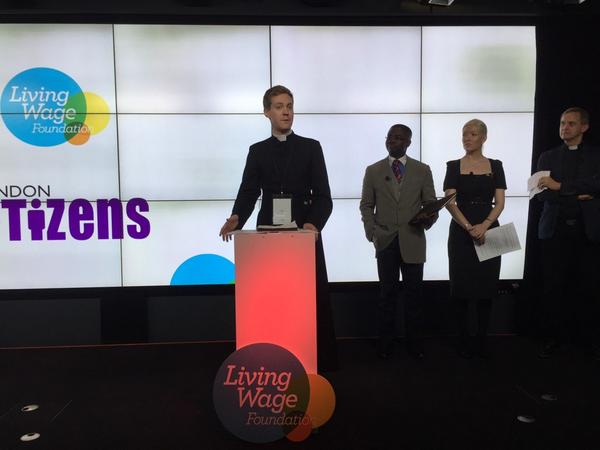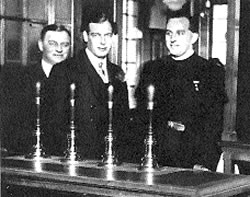 The Revd Dr Simon Cuff is a CTC Research Associate and Curate at Christ the Saviour, Ealing. This week, he delivered the 2015 Jellicoe Sermon at Magdalen College, Oxford. Delivered on All Saints Day, Fr Simon reflects on how we might see the world as the Saints did; as it is, and how it should be…
The Revd Dr Simon Cuff is a CTC Research Associate and Curate at Christ the Saviour, Ealing. This week, he delivered the 2015 Jellicoe Sermon at Magdalen College, Oxford. Delivered on All Saints Day, Fr Simon reflects on how we might see the world as the Saints did; as it is, and how it should be…
“Michelle Obama once told of an outing with Barack Obama early on in their relationship. The romantic Barack had taken her to a meeting of local community leaders he’d worked with after leaving college. The future President stood up, she said: ‘and spoke words that have stayed with me ever since. He talked about “The world as it is” and “The world as it should be,”‘ a distinction often made by community organisers in America, but also those working in this country through the diverse alliance of faith and civil society institutions known as Citizens UK.Our first lesson from the prophet Isaiah is a powerful vision of the ‘world as it should be’. A new heaven and a new earth. The pains and injustice of this life are a distant memory. ‘No more shall the sound of weeping be heard. No more cries of distress. No more infant deaths or lives cut short. ‘They shall not build and another inhabit, or plant and another eat’. Isaiah seems to think that the people of God will have ownership of the means of production but that’s not a prophetic clause for debate this morning.
Isaiah’s vision is a vision of peace and abundance. The kind of world for which we all long. The ‘world as it should be’. As Christians, as people of faith, we have visions like those of Isaiah which paint us pictures of the ‘world as it should be’. We know that the world in which we live in is not the world as it should be, and we know that this is not the world that God wants for his people.We know too, if we’re honest, that we’re partly to blame. This is the Christian doctrine of sin. The world cannot be as it should be, because of our fallen human nature. God does not abandon us in this world – he intervenes through his Son to take the world as it is, and set it free to enable us to enjoy the world as it should be.
But, we know that this world – the world from which Christ died and rose again for our salvation – remains not as it should be. The Resurrection has opened for us the way of salvation, the world as it should be, the new heavens and the new earth. And yet we remain in this one. And we remain partly to blame. Partly to blame because we do not do enough here and now to make the ‘world as it is’ look like the ‘world as it should be’ – we settle for the world as it is.
Michelle Obama went on to describe how the young Barack said: ‘that all too often, we accept the distance between the two, and settle for the world as it is’. Except, all too often, contrary to the young Obama, we don’t. We don’t settle for the world as it is, we fail to see the world as it is. We either convince ourselves that ‘the world as it is’ is basically ok, the lives and people around us aren’t that bad, and there’s nothing we can do about it to make them better. Or, more often, and worse, we refuse to see the world as it really is. We blind ourselves to what is really happening around us, and we chose not to hear the voices of those people on whom our comfort relies. We protect ourselves from knowing the working conditions of those who make our clothes or our food. We ignore the effects of climate change on developing communities far from our homes. We put our fingers in our ears, and shut our eyes.
This morning we celebrate the feast of All Saints – that great cloud of witnesses that surrounds us, as we read in our second lesson from the letter to the Hebrews. The Saints aren’t those who are rewarded for their good behaviour. The idea that individuals earn their place in God’s kingdom by good works has always been regarded as a heresy. The Saints are instruments of God’s grace. Chosen members of Christ’s body, through which God continues his work of salvation of the world.
First and foremost this morning, we ask the Saints to pray for us in our journey through this world, to strengthen us in our lives and in our discipleship, as we might ask prayer of each other here and now. But we also learn from their examples. We see in their lives the qualities of Sainthood, the practice of heroic virtue and lives lived in fidelity to God’s grace. These are the qualities that lead us to believe that those we venerate as Saints are already enjoying the world as it should be in God’s Kingdom.
The Saints, that great cloud of witnesses, each lived lives that strove for the world as it should be. In their lives or in their teaching they pointed toward the world for which we long. Some – but by no means all – managed both, both living lives that lived out the values that govern God’s kingdom and in their preaching setting forth glorious visions of our heavenly home. Others simply lived those Christ-centred lives that show the world as it is that things are not what they should be. And, there are those too whose preaching and teaching set forth the vision to which we aspire, but whose lives, well, left lots to be desired.
God’s Saints are our fellow human beings with all the fragility of humanity that entails. Fellow human beings through whom the grace of God shines out. Fellow human-beings living in the world as it is, but pointing us towards, striving for the world as it should be.
Both of these are important. The Saints not only recognised the world as it should be, they also recognised the world as it is. They preached the Gospel with absolute attention to the world as it is. They observed carefully the realities of human nature so that their preaching might have results in this world. They weren’t blind to the realities of our fallen human or ecclesial systems. The greatest saints like S. Francis or S. Benedict or S. Dominic were those radical reformers who opened their eyes to the failings of the church and set forth a pragmatic vision of how she might better serve her vocation.
The Saints all teach us these two important lessons: to be motivated by a vision for the world as it should be; and to be compelled by an understanding of the world as it really is. Sometimes we hear warnings that if we’re engaged in the world as it is, we’ll be tempted away from our goal – lured by the world’s pleasures or delights; or persuaded to tell people of the world only what they want to hear.
Fr Basil Jellicoe of this college, in whose memory this sermon is preached, helps us here. Through his work with the Magdalen Mission, he had a powerful vision for how the world should be, rooted in how the world really is. He spent time in the community around Somers Town listening and learning what the people wanted from a new housing development – shelter, safety, comfort and a roof over their head. But he didn’t stop there – he gave them not only what they wanted, but what he felt they needed. He adorned the housing developments with items of beauty and decoration believing that these were what those communities needed to inspire the people to think beyond the lives they were living now, and to think about the beauty of lives that might be. Living in the world as it is – building much needed shelter – aspiring to the world as it should be.
How do we apply these lessons from the Saints and from Fr Jellicoe? Like Fr Jellicoe, we must listen. Listen, and tell the stories we hear to others so that too might listen. We must listen to God, speaking to us through Scripture and through his Church to sharpen and inform our sense of the world as it should be. We must listen to the examples of the Saints, to guide us as to how to live out this vision. And, most of all we must listen to our fellow human beings, our sisters and brothers, to each other. Really listening to their needs and concerns, hearing what those around us really want and need. And not just those we talk to all the time about trivial things, but those who are really around us. Our neighbours who live next door to us but whose names we don’t know, those people in our communities who do the jobs and tasks that we don’t want to do but for whom we’re so grateful, those on whom we depend – our cleaners or scouts, our carers, our streetcleaners, our waiters. The people in our communities whose stories we’ve never heard. These are the people to whom the Saints remind us to listen.
These conversations might not always be easy or pleasant. But we know that the example we follow is one that wasn’t always easy or pleasant. Following Jesus Christ, living the Christian life, as the letter to the Hebrews reminds us, is a race that will require perseverance, and will sometimes feel very, very hard. The stories that we’ll hear if we take time to listen will often make us feel uncomfortable. We’ll often be embarrassed by our own privilege or shocked or moved or inspired.
But we’ll we find that as we take time to listen to those around us, as we get to know them, as we share those stories of what we’ve heard, we find something remarkable happening. Through the relationships we begin to build across our community, through hearing the stories that we’re honoured to share, we stop hearing just the voices of those individuals, or even recognising qualities in their lives similar to those of the Saints, and we begin to hear the voice of the one who inspired our efforts in the first place – the ‘pioneer and perfecter of our faith’. And we find that as we immerse ourselves in this listening, in hearing and telling the story of the world as it really is, it’s already looking a little more like the world as it should be.”
You can read previous Jellicoe sermons here.



Leave a Comment